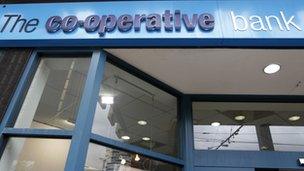Co-op Bank unveils rescue deal to plug £1.5bn hole
- Published

Concerns about Co-op Bank's capital arose after a deal with Lloyds collapsed
The Co-operative Bank has unveiled a rescue plan to tackle the £1.5bn hole in its balance sheet.
Most of the capital to be used to plug the hole will come through a "bail in" - a process where bond holders will be offered shares in the bank.
The deal will result in a stock market listing for the bank.
The bank said the plan meant both investors and the Co-op Group would make "a joint contribution" to the bank's recapitalisation.
"This is the best solution for all concerned," Co-op Group chief executive Euan Sutherland told BBC Radio 4's Today programme.
Co-op boss Euan Sutherland: This is good news for the Co-operative Bank
'Severe consequences'
The plan does not involve any help from taxpayers, but will mean bond holders will lose out in the short term.
Participation is not mandatory and bond investors will be able to vote on the deal. The bank says it will need a majority to agree to the plan for it to go ahead.
A prospectus detailing the offer is expected in September.
If a majority of bond holders do not agree, the Co-op Group - the bank's parent company - would have to find different means of raising the £1.5bn.
However, the bank says that through exchanging their bonds for shares, bond holders will gain a "significant minority stake" in the bank, which will allow them to "share in the upside of the transformation of the bank".
And it warns that agreement will "prevent more severe adverse consequences for all stakeholders which might occur in the absence of such support".
Culture clash?
Around 7,000 retail investors owning permanent interest-bearing shares (Pibs) will be affected by the plan. These Pibs pay dividends of between 5.5% and 13% a year.
The Co-op Bank said the number of shares and bonds offered in exchange for current holdings would be finalised in October - when it expects to launch its offer officially.
The shares will subsequently be listed on the London Stock Exchange.
Cass Business School professor Andre Spice warned that this change from being an institution owned by members to a bank with shareholders could cause problems.
"This change is likely to clash with the co-operative ethos of the bank and, in the longer term, this might undermine what has made the Co-op attractive to its staff and customers," he said.
However, Mr Sutherland denied this meant the bank's culture would change.
"We have always been a PLC [public limited company] wholly owned by the Co-operative Group. The majority of the bank will still be owned by the Co-operative Group. There will be no change to our ethos or the way we run our bank," he told the BBC.
Martin Shaw, chief executive of the Association of Financial Mutuals said: "The most important thing is that customers of the bank, as opposed to investors, will not see any difference."
In addition to the bonds-for-shares swap, the Co-operative Group is also providing extra capital.
Regulator test
The agreement with Co-op is the first test of the new City regulator, the Prudential Regulation Authority (PRA), since it assumed responsibility from the Financial Services Authority in April for regulating the banks. Part of its mandate is to ensure that the banks won't have to be bailed out from taxpayer money again.
The "bail in" structure of the rescue, which the Co-op said it had discussed "in full" with the PRA, will raise capital for the bank by converting bonds into listed shares. It means only those already invested in the bank will help to fund its rescue.
This contrasts with the many bank "bail outs" of 2007-08, in which desperate banks were kept alive by injections of funds from the public sector.
The bank said the deal will increase the level of assets held in reserve as a buffer against potential financial troubles (known as the tier one capital ratio) to above 9% - a level deemed appropriate by the PRA.
But some analysts questioned whether the decision for Pibs investors to take the loss was fair.
Investec analyst Ian Gordon said the Co-operative Group itself could have chosen to inject the necessary capital into the bank, or the bank could have been given a longer period of time to boost its capital levels.
"This wasn't a bust bank. The regulator chose to impose losses on that class of investor when it didn't have to do so. It has picked an easy target," added Mr Gordon.
Pressures on the Co-op
The Co-op Bank has suffered a tough period. In March, the bank reported a £673.7m loss for the year to 31 December 2012, compared with a profit of £54.2m in the previous year.
In April, the Co-op Bank cancelled a plan to buy 631 bank branches from Lloyds Banking Group.
That was followed two weeks later by the ratings agency Moody's downgrading the bank's debt to junk status.
At the time, the agency warned the bank may need "external support" if it could not strengthen its balance sheet.
Most of Co-op Bank's problems stem from bad loans associated with its takeover of Britannia Building Society in 2009.
The Co-operative Group was founded in 1863. It has more than six million members and employs more than 100,000 people.
- Published17 June 2013
- Published17 June 2013
- Published10 June 2013
- Published27 May 2013